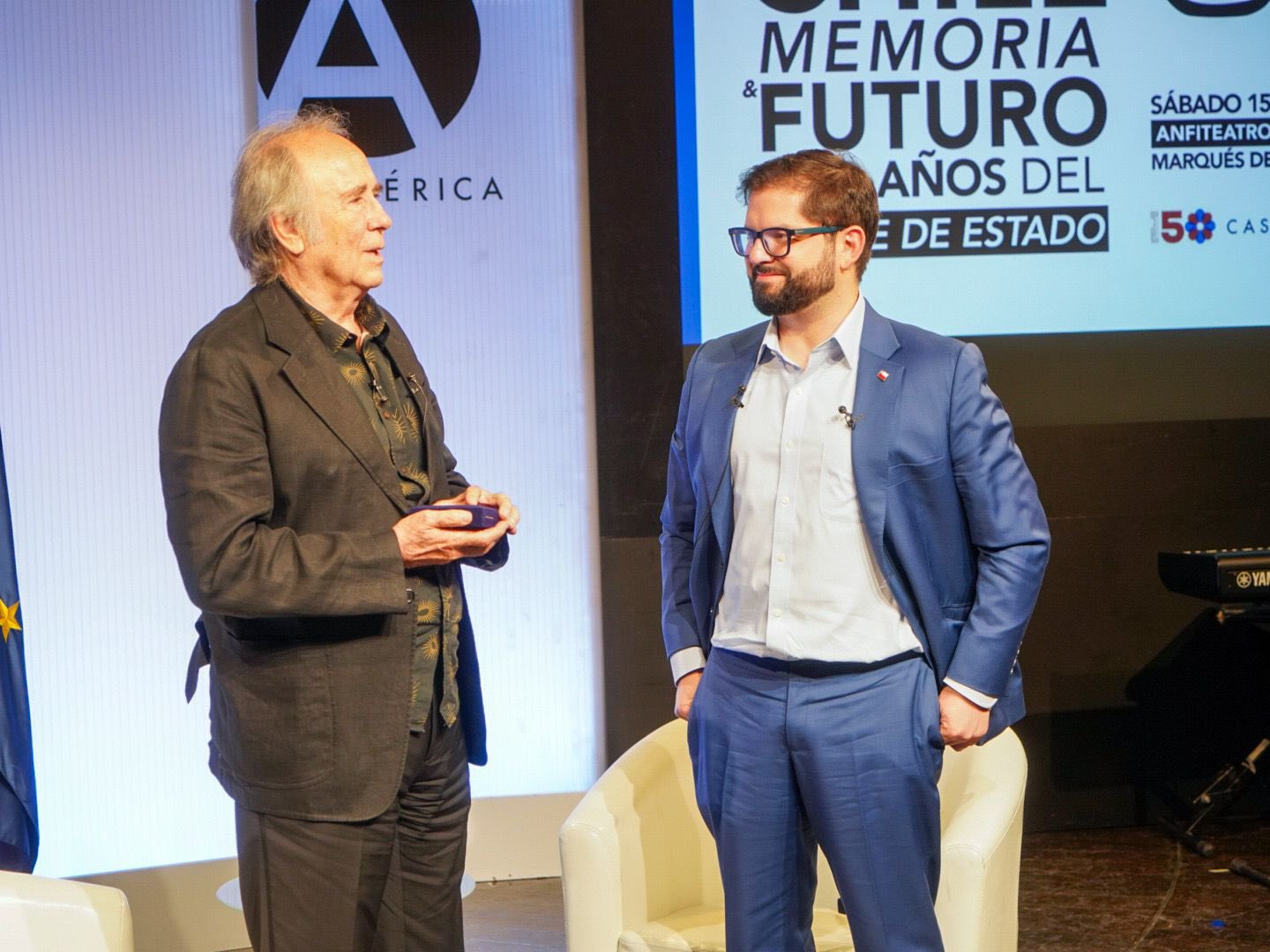The Diplomat
The President of Chile, Gabriel Boric, stressed yesterday in Madrid the historical link between his country and Spain, forged over the last few decades through cultural exchange with exiles from the Civil War and, above all, through the joint defence of both countries in favour of democratic values during the “dark times” of the dictatorships of Francisco Franco and Augusto Pinochet.
Boric, who has been on a two-day visit to Spain on his way to Brussels, where he will attend the EU-CELAC summit, took part in an event organised by the Chilean Embassy at Casa América, at which he presented medals of recognition to the singer Joan Manuel Serrat and the former judge of the National Court Baltasar Garzón, commemorating the coup d’état perpetrated in Chile by Pinochet 50 years ago and the death of the then President Salvador Allende.
In his speech at Casa de América and amidst references to the poetry of Miguel Hernández, Boric also warned of the rise of extremism, regardless of ideology, and proposed a solution based on empathy and “more democracy”. “The bond that unites us, he said, “is related to the experience of our dictatorships, of our struggles to recover democracy”, through “laborious, firm and stumbling efforts to build a regime of freedoms and greater equality”, reports Europa Press.
In a brief historical review that began with the Civil War, Boric defended that both peoples “share the experience of having experienced autocratic and brutal regimes in different contexts” and stressed, however, that Chile “had a fortune derived from a tragedy, which was to receive the enriching and vital current of Spanish exile in crucial decades for our productive, artistic and intellectual development”.
“Our homeland, Chile, will never forget the lesson of solidarity and love across the Atlantic that will always accompany us”, he said, before remembering the poet from Alicante “‘perhaps because I have felt his heart close, close to me, almost touching mine'”.
Speaking about the dictatorships, Boric called for the need to remember the past as a reference point for the present. “Five decades later it still makes sense to remember these events, because they are very present, because they are an open wound, because we are looking for our disappeared, but because defending democracy as (Salvador) Allende defended it until the last day of his life is tremendously important today”, he said.
Nevertheless, the Chilean president stressed that the emergence of totalitarian regimes does not depend on ideology, before giving the example of Nicaragua, whose leader, the former Sandinista Daniel Ortega, is now the target of international criticism for his disdain for human rights.
“There are times, as Nicaragua reminds us, where wearing ‘rojinegro’,” he said, referring to the colours of Sandinismo, “means nothing: the values and principles that should move us is the unrestricted respect for human rights always and everywhere”.
“No difference”, Boric continued, “justifies the violation of human rights and the awareness that the problems of democracy are solved with more democracy, not with less”.
From there, Boric addressed those who “propose as a solution to the problems of the present to limit freedoms, to take away the rights of others, to censor, to deny the rights of women, of migrants, of workers, to deny what they do not like”; a threat “increasingly present in Europe and Latin America, regardless of the colour of whoever comes from”.
Faced with this, the Chilean president called for learning the lesson of dictatorships: “Persecution and injustice have a flip side, a stronger response that endures: neither tyranny nor treason can oppose but not prevail, because for freedom, as Miguel Hernández wrote, we bleed, we fight, we survive,” he said.
Finally, Boric defended a model of government based on constant dialogue with the people to foster empathy among fellow citizens. “Those of us who are in politics have a mandate: we owe it to the people we are part of. We do not speak for them, we speak with them, we speak for them. We are not interpreters of a mystical will,” he declared.
The event was attended by personalities from politics and culture, such as former Prime Minister José Luis Rodríguez Zapatero; the Minister for Equality and leader of Podemos, Irene Montero; Joan Manuel Serrat; Baltasar Garzón and the Nicaraguan writer Gioconda Belli, who has Chilean nationality after being stripped of hers by Daniel Ortega.
Boric took advantage of the celebration, which was entitled “Chile: memory and future 50 years after the coup d’état”, to pay tribute to Serrat and Garzón, to whom he presented commemorative insignia for their commitment to the Latin American country.
“I want to thank you for your commitment, affection and dedication to our country that transcends generations,” Boric said, addressing the 79-year-old Serrat. The singer recalled his first concert in Chile, in 1969, only four years after he began singing professionally, and the visit he paid then to the poet Pablo Neruda in his house on Isla Negra, and referring to the coup d’état, he said: “Those were tremendously hard days and days of great concern for what could be happening and what could be happening to the people you loved and others you did not know, but who were absolutely locked up in that trap”.
As for Garzón, the Chilean President thanked him for his “eternal fight for justice”, recalling that 16 October 1998 when the Spanish judge managed to get the British police to arrest Pinochet in London, opening an extradition process that ultimately did not come to fruition.
“As a judge, as a jurist, as a person, as a human rights activist, it was an honour to add myself to the history of Chile,” the former judge replied. “I took a decision that, from my point of view, was the only one that could and should be taken at that moment, no matter what happened,” he added, adding that “it was in accordance with the law”.






